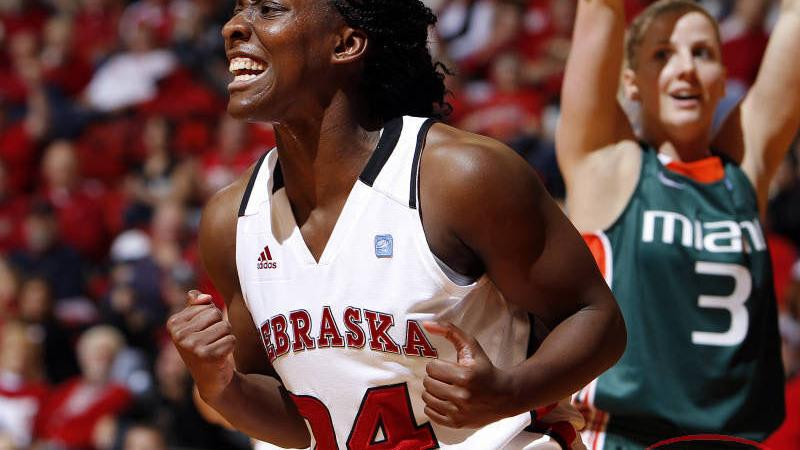
All these years later, he still remembers that knock at the door.
The two Lincoln cops standing there. Waiting to take him — a 14-year-old Black kid — to the police station. Maybe a lie detector test. Maybe fingerprints. Maybe throw him in jail.
Because a white woman claimed that she was robbed by a Black kid and a white kid.
“The reason they came to me was because they figured they could bully me,” Leonard Shepard said.
But it never got that far. Boots Shepard made sure that would never happen to his youngest son. He verbally fired back at the officer, which prompted a threat to take Leonard to jail right then and there. Leonard said that his friend, the accused white kid, didn’t face anything close to the same threats.
The father’s instinct to fight back that day carried over to his youngest son.
In his early life, Leonard Shepard didn’t tolerate racial abuse. On more than one occasion, a call came to the Shepard house reporting a fight that Leonard was involved in at school. The trigger was often a racial slur. When Boots discovered the cause, he no longer had a problem.
“You can’t let them get away with (saying the N-word). If they say it, hit them in their mouth,” Leonard Shepard recalled. “As soon as somebody said it, it was a fight … it was the way we were raised. You had to fight for what you wanted.”
But as he grew older, Shepard realized he had to stop getting in trouble, as difficult as that was at times.
“It’s hard sometimes. You get frustrated. You get pissed. You say things that end up getting you in trouble, or you do things that land you in trouble,” he said. “So, as I’ve gotten older, it’s more trying to be calmer.”
In one corner of Pinnacle Bank Arena, Shepard lays back in his chair, looking up at the ceiling.
Behind him is a poster, titled “Celebrating Black Husker History,” featuring Johnny “The Jet” Rodgers among George Flippin and others.
Shepard tells the story of how one of his older brothers went to Omaha Tech after being kicked out of the house and befriended the future Heisman Trophy winner.
In front of Shepard, there are a couple of pictures of the family he’s now created. One is with his two oldest sons at a rodeo, another with his two youngest children at the Rose Parade a decade ago.
Shepard claimed that out of his 10 siblings, he’s “the worst one” because of the trouble he’s caused. His current position tells a different story. After working at Pinnacle Bank Arena part time since it opened in 2013, he rose up to the rank of engineering lead.
While simply growing older has been one of the biggest factors in his current calm nature, his experiences have also made him realize that he needed to change. There was a fight with a police officer. There was having his first child, and four more. And there was remembering another piece of advice from his father.
“Something my dad told me once finally clicked,” he said. “He told me, ‘If what you’re doing isn’t working, maybe it’s time to try something different.’”
His youngest brother, and one of his closest siblings, Chuck, never saw Leonard as the violent, out-of-control man his record might imply. He said that Leonard is intelligent and pays attention to detail.
“I’m very proud that he’s stuck with it, and that people are recognizing the talent that I saw years ago,” Chuck said.
In 1980, Shepard arrived at the University of Nebraska-Lincoln on a full engineering scholarship. However, he had a bigger reason for coming: He wanted to walk on for the Husker football team.
Shepard started playing football in youth leagues and wanted to quit, but his dad forced him to finish out his first year. Consequently, Shepard found both a passion for football and a “never quit” mentality.
However, that attitude changed when he didn’t make it onto the Huskers’ roster. Once he lost that opportunity, he also lost the motivation to keep going to classes. Shepard wasn’t used to missing the cut, so the experience shook him.
“That was possibly the first failure he ever had in his life,” Chuck Shepard said.
From there, he stumbled along. He spent 1981 doing odd jobs and joined the Nebraska National Guard. He spent time in New Jersey over the summer, then completed advanced training in Georgia to end the year.
Back in Lincoln, while still in the Guard, Shepard spent the next two years as a troublemaker. He smoked weed, drove on a suspended license and hooked up with different girls.
In 1983, a breaking point came. After Shepard broke up a fight between two women, one his girlfriend, the pair got in the car. But, before they could leave, police showed up.
A 17-year-old Leonard Shepard (far left) poses for a homecoming picture on the front steps of Lincoln Northeast High School in the fall of 1979.
According to Shepard: an officer dragged his girlfriend out of the car, putting her in a chokehold. So then, he got out and pulled the officer off of her, ending up in a chokehold himself.
“Once I started to pass out and see stars, I elbowed him and thought, ‘We got to go fight,’” he said.
Backup soon arrived and police arrested Shepard on suspicion of felony assault and disturbing the peace. The charges eventually were reduced to disturbing the peace, but he spent a year on probation.
With that behind him, Shepard applied for an apprenticeship program with the International Brotherhood of Electrical Workers.
But there were problems that kept him on edge. Co-workers avoided him on lunch breaks. His foreman called him racial slurs behind his back. He didn’t feel like he was wanted.
One day after a shift, he headed to his car, only to be greeted by a large dog. A white German shepherd.
“The guy at the job site goes, ‘Hey, did you see that? The white shepherd for the Black Shepard,’” he said. “I was like, ‘Really?’ It was just stupid.”
Two years later, Shepard got kicked out of the program after cracking a small joke to his foreman, who he thought was “out to get him.” But by then, he had all he needed to continue his turnaround and his career.
In 1986, Shepard packed his bags and headed for California, where he stayed seven years, working as an electrician.
Returning to Lincoln in 1993, he came back with a wife and their first child together, Mason, a boy. Two more kids were born in the next four years — Malcolm, named after Omaha native Malcolm X, and Mikayla.

Leonard Shepard with two of his children on his 40th birthday at Itchycoo Park for a rodeo in Douglas, Nebraska, in 2002.
Courtesy photo
Although he was now raising a family, you could still find Shepard “kicking ass.” He was a bull rider, frequently hitting the rodeo circuit. But with bucking bulls, a hectic work schedule and a young family, something had to give.
“When (Mikayla) was born, my wife said, ‘Hey, you need to start working here in town,’” Shepard said. “So I started working in town. I was working for a guy who wasn’t the smartest, and I realized if he can get his master’s, I can get mine.”
After getting his electrician license, Shepard started working for himself in 1998 and did so until Pinnacle Bank Arena opened in 2013.
Working at the arena has been one of Shepard’s most consistent jobs, but the past eight years have come with their own ups and downs.
While he enjoys his job overall, the work days are long. He said that sometimes, he’ll arrive at work at 5 a.m. and return home at 1 a.m. the next morning. Most of Shepard’s work is fixing whatever needs to be fixed, whether that’s unclogging a toilet or fixing lights on the catwalk.
The highlights have been when celebrities come to town. One of Shepard’s best memories was when Weird Al Yankovic came to town, and subsequently clogged the toilet. Shepard, who was charged with solving the issue, met Weird Al in his dressing room, where the star apologized profusely.
Regardless of the highs and memorable moments, hardships away from the arena have impacted his life and crept into his job. Around the same time he started at the arena, Shepard and his wife “grew apart” and got divorced. He had a DUI a few years ago, which he said played a part in preventing him from earning a promotion.
However, he looks back on his life with gratefulness.
“There are moments where I’ve been in a bad mood for weeks. And it shows, people say stuff to me,” he said. “… Part of it is just thinking back where I could be at this moment. So it makes you a little happier.”
Another change Shepard has seen in recent years is watching his five kids grow up and leave the house. The divorce negatively impacted the relationship he had with his kids, but he’s made sure to prioritize the connection with his children.
“Family’s pretty much all you got. My brothers, my sisters, we’re all close, and the kids, I’m close to them,” he said. “We all have our moments, don’t get me wrong, but for the most part, we’re a close-knit family.”
Shepard said valuing family is how he was raised by his late parents. He holds close to him all the lessons they taught him. And for that, along with how far he’s come, he’s happy.
“I think my mom and dad would probably be proud of me right now. I became a master electrician and I’m here at the arena. Yeah, I think they’d be very proud of me.”
“Don’t argue with a fool, because they may be doing the same thing,” his mother used to say.
To Shepard, the meaning is clear: By continuing to argue with someone who is clearly ignorant, you seem just as foolish. It’s a lesson he’s passed down to each of his children.
“I had to use that quote last night,” said daughter Mikayla, a 23-year-old health and wellness coach. “Why waste my thoughts and ideas when it’s never going to get through to them? And maybe on their end, they’re thinking I’m a fool, so the conversation is going nowhere.”
The youngest of his five children, Marshall, attends UNL. His place among his siblings is a link to his father and grandfather, both of whom were also the youngest in large families.
“I do feel like I have some shoes to fill just because I’m the youngest of the youngest of the youngest,” Marshall said. “So I feel like he has always felt that connection because he can relate.”
Marshall’s fondest memories with his father range from going to a WWE event in Omaha to a Jay Z concert at Pinnacle Bank Arena, when Leonard Shepard fixed the lights after they went out.
Although the divorce disrupted family get-togethers, there have still been moments when they all join in.

Leonard Shepard jumps into the water during a family vacation in Colorado Springs, Colorado in the summer of 2020.
Courtesy photo
Last summer, Shepard and his family traveled to Colorado. It was Mikayla who led the family to Guffey for a bit of cliff jumping. But, upon arrival, she had second thoughts.
Among the flowing waterfalls and clear skies, Leonard Shepard, despite his own fear of heights, imposed the lesson from his father that had taken him so far in life: He didn’t let anyone quit.
“He said, ‘Just do it. I’m right here,’” recalled Mikayla. “We climbed this mountain together, and I jumped off the cliff. He was right behind me.”
Top Journal Star photos for June
Top Journal Star photos for June

Hunter Boydston successfully reaches the 8-second mark in the Bull Riding competition on Saturday, June 19, 2021, at Adams County Fairgrounds. EAKIN HOWARD, Journal Star
EAKIN HOWARD
Top Journal Star photos for June

Behlen Coffman (8722, age 9) and Max Jurgens (8826, age 7) high five Nebraska football players as they begin the 1 mile run on Sunday, June 20, 2021, outside Memorial Stadium. EAKIN HOWARD, Journal Star
EAKIN HOWARD
Top Journal Star photos for June

Dalton Kunkee (105) and his partner Sid Miller race to rope their steer in the Team Roping competition on Saturday, June 19, 2021, at Adams County Fairgrounds. EAKIN HOWARD, Journal Star
EAKIN HOWARD
Top Journal Star photos for June

Chrissy Brooks holds a rainbow flag as the parade passes by on Saturday, June 19, 2021, at Nebraska State Capitol. EAKIN HOWARD, Journal Star
EAKIN HOWARD
Top Journal Star photos for June

Saltdogs’ Curt Smith (10) gets a hug from teammate David Vidal after he hit his 90th homer for the team in the 8th inning against the Houston Apollos on Thursday, June 17, 2021, at Haymarket Park. FRANCIS GARDLER, Journal Star
FRANCIS GARDLER Journal Star
Top Journal Star photos for June

Sculptor Benjamin Victor works on the clay model of Susan La Flesche Picotte, Thursday, June 17, 2021, at Jayne Snyder Trails Center. JUSTIN WAN, Journal Star
JUSTIN WAN Journal Star
Top Journal Star photos for June

Wendy Huynh, CEO of MW Climbing, climbs a route on Wednesday, June 16, 2021. GWYNETH ROBERTS, Journal Star
GWYNETH ROBERTS, Journal Star
Top Journal Star photos for June

Wayne Garrelts (with cap) and Kevin Madsen (with glasses) laugh at a comment from Nebraska football coach Scott Frost on Wednesday, June 16, 2021, during the the annual Big Red Blitz at the Younes Conference Center South. FRANCIS GARDLER, Journal Star
FRANCIS GARDLER Journal Star
Top Journal Star photos for June

A trio of horses feast on an abundance of high grass on Tuesday, June 15, 2021, at a farm along W. Van Dorn St. near Pioneers Park. Temperatures are forecasted to reach over 100 degrees later this week. FRANCIS GARDLER, Journal Star
FRANCIS GARDLER Journal Star
Top Journal Star photos for June

Lyla Hardrick sprays her sister Santana with water while playing on the beach on Monday, June 14, 2021, at Holmes Lake. EAKIN HOWARD, Journal Star
EAKIN HOWARD
Top Journal Star photos for June

Bella, a 10-year-old cheetah, chases a lure in the cheetah run on Monday, June 14, 2021, at Lincoln Children’s Zoo. GWYNETH ROBERTS, Journal Star
GWYNETH ROBERTS, Journal Star
Top Journal Star photos for June

Jane Wiederspan holds Bunnie, age 10, on Sunday, June 13, 2021, at the First-Plymouth Congregational Church. Bunnie is a rescue dog who has no eyelids which required her to wear sunglasses. EAKIN HOWARD, Journal Star
EAKIN HOWARD
Top Journal Star photos for June

Saltdogs’ pitcher Greg Minier (44) throws a pitch on Saturday, June 12, 2021, at Haymarket Park. EAKIN HOWARD, Journal Star
EAKIN HOWARD
Top Journal Star photos for June

The drummer plays with Jamey Johnson plays on Friday, June 11, 2021, at Pinewood Bowl. EAKIN HOWARD, Journal Star
EAKIN HOWARD
Top Journal Star photos for June

Fans hold their gloves in the air hoping to get a foul ball at a Saltdogs game on Thursday, June 10, 2021, at Haymarket Park. EAKIN HOWARD, Journal Star
EAKIN HOWARD
Top Journal Star photos for June

Saltdogs’ Justin Byrd (21) falls into the bullpen after catching a ball hit by Kane County’s Brandon Chinea in the third inning on Friday, June 11, 2021, at Haymarket Park. FRANCIS GARDLER, Journal Star
FRANCIS GARDLER
Top Journal Star photos for June

The crowd reacts as Whiskey Myers third song ends on Friday, June 11, 2021, at Pinewood Bowl. EAKIN HOWARD, Journal Star
EAKIN HOWARD
Top Journal Star photos for June

An Amtrak On Board Services team member looks out the window as the train pulls out of the station on Friday, June 11, 2021, at Lincoln Station. EAKIN HOWARD, Journal Star
EAKIN HOWARD
Top Journal Star photos for June

People sleep in the Amtrak station waiting for the California Zephyr train, which arrived 1:55 late on Friday, June 11, 2021, at Lincoln Station. EAKIN HOWARD, Journal Star
EAKIN HOWARD
Top Journal Star photos for June

Middle school age campers work together to get their blindfolded fellow campers across an obstacle during a cooperative activity at Carol Joy Holling Camp on Thursday, June 10, 2021. GWYNETH ROBERTS, Journal Star
GWYNETH ROBERTS, Journal Star
Top Journal Star photos for June

Fourteen new Lincoln Police Department officers were sworn in during a ceremony in front of their family and friends on Wednesday, June 9, 2021, in the Lincoln North Star High School auditorium. The recruits will hit the streets with their first field training assignments on Thursday. FRANCIS GARDLER, Journal Star
FRANCIS GARDLER
Top Journal Star photos for June

L – R) Charlie Troxel, Amy Struthers and Ramona Meester follow Aging Partners community health educator Tracie Foreman in Quigong exercises as part of a free drop-in 1-hour circuit training class in the FitLot, part of a partnership between Aging Partners and Lincoln Parks and Recreation, on Friday, June 4, 2021, in Woods Park. GWYNETH ROBERTS, Journal Star
GWYNETH ROBERTS, Journal Star
Top Journal Star photos for June

A koi fish searches for snacks among the water lilies in the Sunken Gardens on Thursday, June 3, 2021. GWYNETH ROBERTS, Journal Star
GWYNETH ROBERTS, Journal Star
Top Journal Star photos for June

North’s Trevor Marshal (14) catches a pass before running it into the end zone as a penalty is called on the play in the Shrine Bowl on Saturday, June 5, 2021, at the Ron & Carol Cope Stadium in Kearney. EAKIN HOWARD, Lincoln Journal Star
EAKIN HOWARD
Top Journal Star photos for June

Nebraska’s Head Coach Scott Frost talks to the athletes who attended the Friday Night Lights camp on Friday, June 4, 2021, at the Memorial Stadium. EAKIN HOWARD, Lincoln Journal Star
EAKIN HOWARD
Top Journal Star photos for June

Tony White, a civilian navigation instruction and a retired Air Force Lt. Col. who has worked with the Open Skies program since 2006, sits at the cockpit at the final OC-135B Open Skies aircraft, Friday, June 4, 2021, at Lincoln Airport. JUSTIN WAN, Journal Star
JUSTIN WAN, Journal Star
Top Journal Star photos for June

Lincoln Fire and Rescue recruit Brian Sydik helps Alliance wrestling team member Jackson Bailey put on the SCBA tank on Wednesday, June 2, 2021, at LFR’s training facility. GWYNETH ROBERTS, Journal Star
GWYNETH ROBERTS, Journal Star
Top Journal Star photos for June

Ed Love, director of Nebraska Jazz Orchestra, conducts the band on the first show of Jazz in June on Tuesday, June 1, 2021, at Sheldon Sculpture Garden. JUSTIN WAN, Journal Star
JUSTIN WAN, Journal Star
Top Journal Star photos for June

The crowd cheers for Nebraska Jazz Orchestra on the first show of Jazz in June on Tuesday, June 1, 2021, at Sheldon Sculpture Garden. JUSTIN WAN, Journal Star
JUSTIN WAN, Journal Star
Top Journal Star photos for June

Josh Whitfield (L) scoops up dog poop with help from Kathy Rohwedder as the pair’s dogs take advantage of the neighbor’s adjoining backyard on Tuesday, June 1, 2021. GWYNETH ROBERTS, Journal Star
GWYNETH ROBERTS, Journal Star
Top Journal Star photos for June

An attendee throws a pass during the Friday Night Lights camp on Friday, June 4, 2021, at the Memorial Stadium. EAKIN HOWARD, Lincoln Journal Star
EAKIN HOWARD

Must See
-
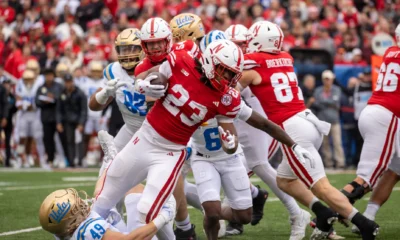

Football
/ 2 months agoHuskers Fight Hard but Fall Short Against UCLA
LINCOLN – The Nebraska Cornhuskers gave it their all on Saturday, with standout efforts...
-
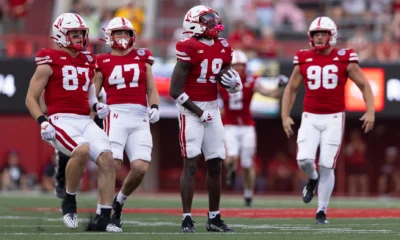

Football
/ 3 months agoGAMEDAY: Nebraska Set to Face Undefeated Indiana in Key Big Ten Showdown
Bloomington, IN – It’s Game Day, Husker Nation! Nebraska (5-1, 2-1 Big Ten) returns...
-
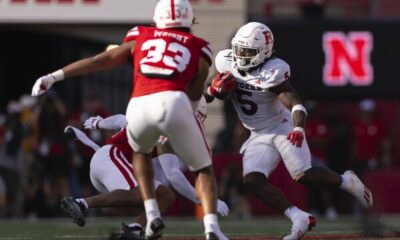

Football
/ 3 months agoBlackshirts Shine as Nebraska Tops Rutgers 14-7 on Homecoming
Lincoln, NE – Nebraska’s Blackshirt defense played a starring role in the Huskers’ 14-7...
By Chris
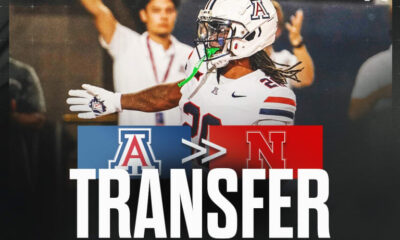

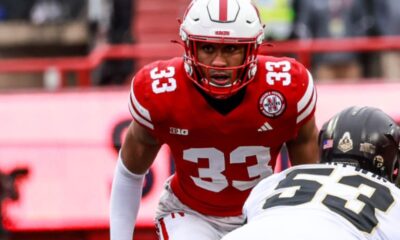

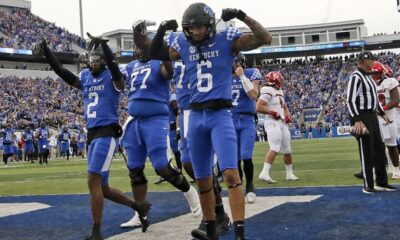

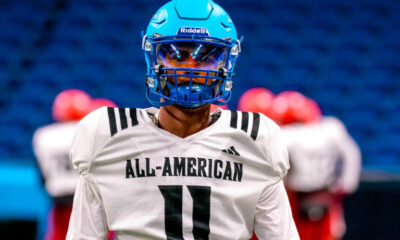

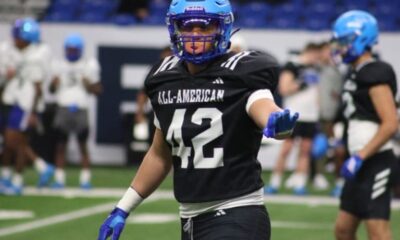

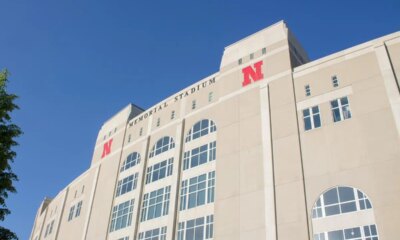

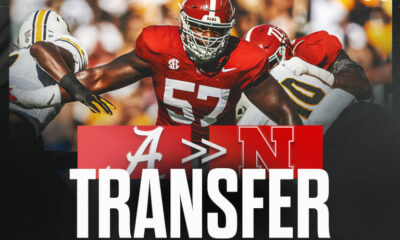

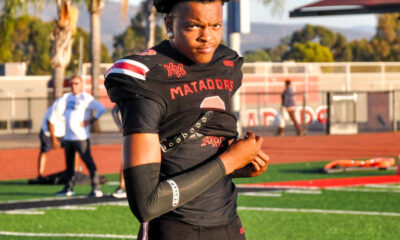

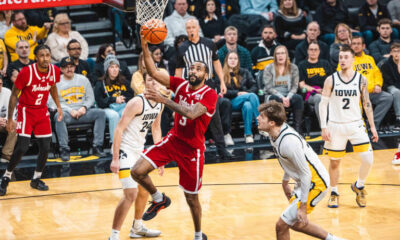





You must be logged in to post a comment Login